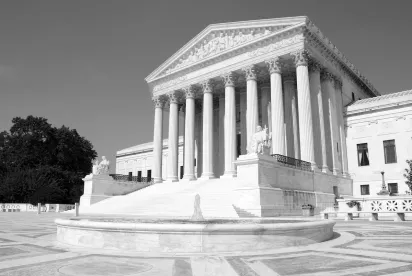On July 8, 2020, the Supreme Court gave religious employers wide leeway to hire and fire employees whose duties include religious instruction without having to worry about employment discrimination suits. In a 7-to-2 decision, the Supreme Court ruled in Our Lady of Guadalupe School v. Morrissey-Berru that the “ministerial exception” – a legal doctrine that shields religious employers from anti-discrimination lawsuits – foreclosed the adjudication of two discrimination lawsuits brought by Catholic school teachers.
In reaching its conclusion, the Supreme Court relied on its 2012 decision, Hosanna-Tabor Evangelical Lutheran Church and School v. EEOC, in which the Court unanimously held that the “ministerial exception” protected a religious school’s First Amendment right to choose its own religious teachers by exempting these institutions from anti-discrimination laws when employees are deemed “ministers.” In Hosanna-Tabor, the justices set out a loose framework for when the ministerial exception should apply, but refused to adopt any sort of rigid legal test. These factors included:
- whether the employer held the employee out as a minister by bestowing a formal religious title;
- whether the employee’s title reflected ministerial substance and training;
- whether the employee held herself out as a minister; and
- whether the employee’s job duties included “important religious functions.”
In Hosanna-Tabor, the Court held that the plaintiff qualified as a “minister” under the ministerial exception. Applying this four-factor analysis, the Court considered the plaintiff’s title, “Minister of Religion, Commissioned,” as well as her intensive formal religious training and education. The Court found persuasive the fact that plaintiff was responsible for teaching religion and participating with students in religious activities. Accordingly, the Court determined that the plaintiff qualified as a “minister,” under the exception and therefore, her employment discrimination claim could not be decided by the courts. While Hosanna-Tabor provided courts with a helpful framework for determining whether the ministerial exception applies, the exact implications and boundaries of the exception, as well as the weight that should be placed on each factor, remained uncertain.
The Morrissey-Berru decision now provides clarity concerning when the ministerial exception applies. In this case, one of the teachers, Kristen Biel, sued under the Americans with Disabilities Act after she learned she had breast cancer and her contract was not renewed. The other teacher, Agnes Morrissey-Berru, sued under the Age Discrimination in Employment Act of 1967, alleging her employer demoted her and failed to renew her contract in order to replace her with a younger teacher. Both religious employers invoked the ministerial exception and successfully moved for summary judgment at the district court level, but in both cases the Ninth Circuit reversed, reasoning that the teachers did not have the formal title of “minister,” had limited formal religious training and ministerial backgrounds, and lacked the credentials to invoke the ministerial exception.
The Supreme Court disagreed, finding that the Ninth Circuit incorrectly utilized a more stringent and formulaic interpretation of Hosanna-Tabor when finding that neither Ms. Biel nor Ms. Morrisey-Berru fell within the ministerial exception. The Court stated that the four factors in Hosanna-Tabor were not to be treated as “checklist items to be assessed and weighed against each other in every case” and that the factors discussed therein were never intended to impose any “rigid formula.” Instead, the Court took a broader view, emphasizing that courts should “take all relevant circumstances into account and to determine whether each particular position implicated the fundamental purpose of the exception.”
In concluding that Ms. Biel and Ms. Morrisey-Berru fell within the ministerial exception, the Supreme Court assessed the circumstances as a whole, rather than following a strict legal formula. For example, both teachers’ employment agreements and faculty handbooks specified that they were expected to carry out the school’s mission of developing and promoting a Catholic faith community and imposed commitments regarding religious instruction, worship, and personal modeling of the faith and explained that their performance would be reviewed on those bases. Additionally, the teachers taught religion in the classroom and worshipped and prayed with the students. The Court was not concerned with the fact that the teachers’ title did not include the term “minister.” Given these circumstances, the Court held that Ms. Biel and Ms. Morrisey-Berru fell squarely within the ministerial exception, and therefore, their discrimination claims were barred.
Going forward, courts must assess a variety of factors in determining whether an employee who works at a religious institution falls under the ministerial exception. “What matters, at bottom, is what an employee does,” the Court said.
While the Morrissey-Berru decision arose out of a religious school setting, given the broad interpretation of the decision, religious institutions of varying types will now have a strong argument for protection against discrimination claims brought by their employees who perform a wide array of faith-based functions for the organization. Employers with questions about how to best assess whether the ministerial exception applies to an employee within their organization or to effectively defend against discrimination or retaliation claims, should consult with experienced employment counsel.
*Jamie Moelis is a law clerk with Sheppard Mullin.



 />i
/>i

